From Perth to Inverness runs the Highland Railway, that
pierces through the heart of the Grampians. Giving off a branch to Loch
Tay and coach routes to other choice nooks of the noblest northern county,
this line mounts among the wilds of Atholl, and near its highest level
brings us into Inverness-shire ; then it descends to the old Badenoch
Forest, down the upper course of the Spey, past Kingussie to Aviemore,
where its main track turns over the Findhorn, and by Culloden to the
capital of the Highlands. There is not a finer railway ride in the
kingdom, as the tourist knows well enough from his programmes, so the
Highland line needs no advertisement here. But there is an older use of
this name, for the irregular line along which the Highlands fall in a
broken wave upon the richer country, a zone pointed out by Scott and other
writers as the most charming part of Scotland. The austere spirit of
mountain solitudes is not so easily caught as the varied charms of a
debateable land, where "the rivers find their way out of the mountainous
region by the wildest leaps, and through the most romantic passes," and
Nature's rugged features straggle down among good roads and inns, the
practical and the picturesque throwing each other into alternate relief.
This is the special loveliness of southern and eastern Perthshire, across
which the Grampians make an oblique border, once too often marked with
fire and sword, while its straths and lake basins repeat in miniature the
same mingling of Highland and Lowland scenery, and of homes thus
contrasted by "Ian Maclaren":—
"The lowland farm stands
amid its neighbours along the highway, with square fields, trim fences,
slated houses, cultivated after the most scientific method, and to the
last inch, a very type of a shrewd, thrifty, utilitarian people. The
Highland farm is half-a-dozen patches of as many shapes scattered along
the hillside, wherever there are fewest stones and deepest soil and no
bog, and those the crofter tills as best he can—sometimes getting a
harvest, and sometimes seeing the first snow cover his oats in the sheaf,
sometimes building a rude dyke to keep off the big, brown, hairy cattle
that come down to have a taste of the sweet green corn, but often finding
it best to let his barefooted children be a fence by day, and at certain
seasons to sit up all night himself to guard his scanty harvest from the
forays of the red deer. Somewhere among the patches he builds his
low-roofed house, and thatches it over with straw, on which by and by,
grass with heather and wild flowers begins to grow, till it is not easy to
tell his home from the hill. His farm is but a group of tiny islands amid
a sea of heather that is ever threatening to overwhelm them with purple
spray. Anyone can understand that this man will be unpractical, dreamy,
enthusiastic, the child of the past, the hero of hopeless causes, the seer
of visions."
We have already crossed the Highland line to the
Trossachs. Now, in a few hours' walk by less famous scenes, let me lead
the reader right up into the Highlands
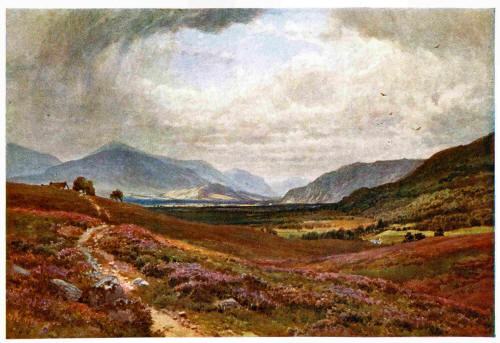
The Grampians from Boat of Garten, Inverness-Shire
from the North Inch of Perth. Our way shall be the
green banks of the Almond, with only now and then a turning aside on the
roads which are seldom the most pleasing features of a Scottish
countryside. The name, properly Almaine, as Wordsworth has it,
seems of the same origin as the Irish Bog of Allen, Moine Almhaine
in Celtic. There is more than one Almond in Scotland, which has countless
streams of which this is a type, a true Highland water, now gathering into
creamy pools, now rushing over pebbly shallows, here pent in a leafy glen,
there rippling by open fields and works of man, everywhere wilful,
cheerful, and eager.
At the Almond mouth, over which it straggles thinly in
summer to join the swirls of the Tay, is believed to have stood the Roman
station that may or may not have been the original Perth. The tributary's
right bank is edged by a wide sward, up which anglers and other idlers can
stroll freely for miles, unless barred by the red flag of a rifle range
that has sent not a few marksmen to Wimbledon and Bisley. On this side
stands a fragment of Huntingtower, a castle of the Gowries, widely known
by the song founded on an obscure ballad, with the same motive as the
English "Nut-brown Maid," in which a high-born lover—supposed to have been
a Duke of Atholl —puts his sweetheart to the test by pretending to take
leave, to be poor, to be already married ; then, when nothing can shake
her fidelity, rewards her with full avowal—
Blair in Atholl's mine, Jeanie!
Little Dunkeld is mine, lassie!
St. Johnston's bower and Huntingtower—
And a' that's mine is thine, lassie !
Here the idle stream is harnessed to service in
bleach-works, whose white ware spread on green slopes makes a feature of
the scenery about Perth. Above the villages of Almondbank and Pitcairn
Green, the stream, like Simon Glover's apprentice, throws off its
industrial disguise to put on a Highland garb of rocks and dells and bosky
braes. A beautiful spot is the Glen of Lynedoch, famed by a touching
tradition which the graves of Bessie Bell and Mary Gray attest as no mere
legend. These " bonny lasses," as their song styles them, were bosom
friends who beside the Almond built themselves a bower as refuge from the
Great Plague, raging in Perth as in London. According to the story, they
were visited by a lover who brought them food, and with it the fatal
infection. Prosaic critics point out that such bowers were used as
isolation huts for suspected cases. At all events, the girls died in their
hermitage, and were brought to be buried at Methven Church, but the
Methven folk stoned back the bearers of contagion from the ford ; then in
death, as in life, the bodies found a home by the Almond. Their fate was
so well though vaguely remembered, that both Burns and Scott came to make
inquiries about the grave, which had already been enclosed by the owner of
the property, and is now marked by a railing, beneath a clump of yews, and
by the inscription "They lived—they loved—they died."
A more modern romance haunts this glen. Here stands in
ruin the deserted mansion of a laird driven by grief into renown. This was
Thomas Graham, who in the latter part of the eighteenth century devoted
himself to such "improvements" as were then the fashion with
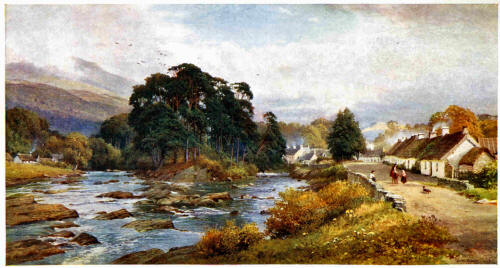
Killin, Perthshire
cultured landowners, and planted exotic growths now
running wild among the native greenery. The death of his beautiful wife,
painted by Gainsborough, struck him so deeply to heart, that, when over
forty years of age, he went to the wars, and rose to be the Lord Lvnedoch
who won the battle of Barossa. He had two other Peninsular veterans as
neighbours, all three of them eyewitnesses of Sir John Moore's burial at
dead of night, Sir George Murray, Wellington's Quartermaster-General, and
Sir David Baird, of whom it is told that, when his mother heard how he was
among Hyder Ali's prisoners, chained two and two, her first remark was,
"Lord pity the chiel that's chained to oor Davie!" On either side are
scenes of battles long ago: to the south, Methven, a disaster for Bruce,
and its neighbour Ruthven, a victory for Montrose; to the north, Luncarty,
where the founder of the Hay family is said to have turned the tide of
battle against the Danes, by rushing in with his plough coulter like a
legendary Nicol Jarvie.
Glenalmond, little sought as it is by strangers, is
better known to many of Mudie's subscribers than they may be aware, being
clearly the chief scene of "Ian Maclaren's" popular tales, in which, while
dwelling so much on the character of the inhabitants, the author seems
strangely reticent as to natural charms, well hinted at indeed in the
title Bonnie Brier Bush. Drumtochty— the real name of a farm—is
Logie Almond with its Heriotsfield village; Kildrummie is Methven; and
Muirton, of course, is Perth. Some of his personages, also, appear taken
from real prototypes, touched up into very much of fancy pictures, if
neighbours are to be believed.
A little higher comes Trinity College, Glenalmond,
founded as a buttress to the Scottish Episcopal Church, on the model of
English public schools. Its first head was Dr. Charles Wordsworth, nephew
of the poet, formerly second master at Winchester, and once tutor to Mr.
Gladstone, with whom his conscientious disagreement in politics barred the
ecclesiastical promotion which he deserved as well as his brother,
Christopher of Lincoln. He never rose farther than the elective bishopric
of the diocese which it pleases Scottish Episcopalians to style that "of
St. Andrews, Dunkeld, and Dunblane"; and of late years their prelates have
taken to sign themselves by such territorial designations, assumed by men
whose legal status in the country is that of dissenting ministers. When
Dr. Wordsworth became bishop, the whole income of himself and his score of
clergy was some £2000 a year; but he had a private endowment in
"Wordsworth's Greek Grammar," which enabled him without shame to give out
from the pulpit, as I have heard, "It is my dooty to announce to you that
a collection will be made in this chapel, next Sunday, for the purpose of
increasing the income of the Bishop of the diocese." He was a learned and
amiable man, but without much knowledge of human nature, as shown by his
earnest effort to preach an Eirenicon between his exotic prelacy and
Scotch Presbyterianism. In his memoirs he states that his Glenalmond
pupils were the most Christian and gentlemanly boys he ever knew, on which
let me comment that I have reason for calling some of them arrant
poachers, whom the discipline of early days did not restrain from going
fishing in the "wee short hours ayont the twal'." He cherishes the
recollection that he
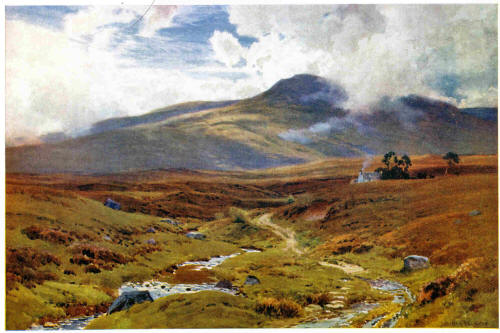
A Moor near Killin, Perthshire
had to expel only three of them, and that these were
all "schismatics." I take him to have been deficient in sense of humour,
to judge by the gusto with which he read aloud his great-uncle's most
droning effusions. He would probably not have relished a story a friend of
mine used to tell of North-Western Canada. Those wilds, in early days,
were the charge of an Archbishop, who, visiting an unsophisticated part of
his diocese, put up with a Scotch Presbyterian farmer as owner of the best
house in the settlement. This hospitably entertained prelate, remarking
how a newly born baby made part of the family, delicately inquired as to
whether it had been yet baptized, and hinted that the parents might like
to take advantage of such an occasion. But the good man seemed not duly
pleased by the honour thus proffered. "I'll just step ben, and see what
the mistress thinks," he said awkwardly; then presently returning: "We're
both much obliged to ye, sir—we take it kindly; we know ye mean well; but
if ye'll no mind, the mistress would rather wait till a regular meenister
comes round."
The attempt to root a Winchester on the Highland border
did not for a time find much deepness of earth, but the school has since
flourished under other masters. Its lordly building had the fate of being
set on fire by an unworthy pupil, son of an ex-Minister, whose connections
could not save him from being brought to justice. A more tragic scandal,
now a generation old, was when the owner of the neighbouring mansion, the
second legal dignitary of Scotland, having been convicted of parliamentary
bribery on the previous step of his career, both cut his throat and threw
himself into the Almond. This points the moral of an abuse that has
flourished more rankly in Scotland than in England, whereby legal posts go
as spoils of party victory, though indeed a better era seems inaugurated
by a Conservative Government which recently honoured itself by giving the
highest judicial office to a political opponent as the most worthy. But we
should not get far, if we are to stop for all the stories of fire and
blood that haunt the Highland line.
Glenalmond now leads us fairly into the Highlands, and
by the river we hold up through the Sma' Glen, or as Wordsworth calls it,
the Narrow Glen, whose lion is the legendary grave of Ossian, man or myth,
that had a more congenial birthplace in the "tremendous wilds" of Glencoe
declared by Dickens "fearful in their grandeur and amazing solitude."
In this still place, where murmurs on
But one meek streamlet, only one,
He sang of battles, and the breath
Of stormy war, and violent death;
And should, methinks, when all was past,
Have rightfully been laid at last
Where rocks were rudely heaped, and rent
As by a spirit turbulent;
Where sights were rough and sounds were wild,
And every thing unreconciled,
In some complaining, dim retreat
For fear and melancholy meet;
But this is calm; there cannot be
A more entire tranquillity.
Our half-day's walk may be prolonged to a whole one by
path up the Almond and across to Loch Tay; but if one seek pleasant
quarters not so far off, at Newton
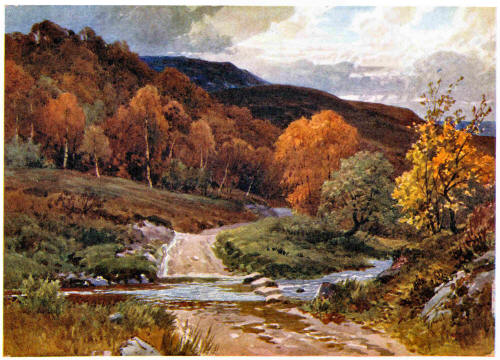
In Glenfinlas, Perthshire
Bridge he may turn south by Foulford and Monzie to
Crieff. This cheerful little border town ranks as favourite
sommerfrische of Scots folk, apart from those places that are more
sought by tourists. Well situated, looking south from the lowest slope of
the hills, almost in the centre of the country, it is unusually dry as
well as airy and genial, not pent in like Callander, nor too bracing for
cold-blooded folk like Braemar. So Crieff has now two railways and
everything handsome about it. Its spacious market-place proclaims it an
old borough, with tolbooth, cross, and iron "jougs" for the terror of
offenders; and here once the "kind gallows of Crieff" gave Lowlanders'
answer to that high-flown boast—
Aye, by my soul, while on yon plain
The Saxon rears one shock of grain;
While often thousand herds there strays,
But one along yon river's maze,
The Gael, of plain and river heir,
Shall with strong hand redeem his share!
Why the kind gallows? not even Scott can say,
but he suggests the idea of this seeming a kindred or natural doom to the
Highlanders, who, it is said, used to doff their bonnets on passing a
shrine fatal to so many of their blood. The gallows have now been well
replaced by an endowed public school on the Scottish pattern ; and perhaps
the most important institution of modern Crieff is the Hydropathic, which,
under the shelter of the Knock Woods, gathers Saxon and Celt together in
sober amity. There are other such hostelries about the Highland line; but
that of Crieff, one of the earliest, is still one of the most popular.
"Hydropathics" in Scotland—nobody thinks of calling
them Establishments—do not much depend on hydropathy, which, in summer at
least, falls to the background of their sociable life. They are more
concerned with the administration of water internally. Where whisky is
devoutly worshipped, there arises a strong nonconformist party leagued
against the devil's sacrament, hence the vogue of these big temperance
hotels, in which unhappy moral weaklings will be sometimes kept by their
families, while others, conscious of feeble will, are glad to be out of
the way of temptation. In the holiday season, the better class of
townsfolk much affect the wholesome amusements of such pensions,
most of them palatial and some expensive. And if strong drink be necessary
for human happiness, it is whispered how that can be enjoyed, sub rosa,
even within the walls of a hydropathic, with all the added zest of a
"fearful joy." As the rigour of Maine laws does not always hinder an
American hotel guest from "seeing the striped pig" or "giving ten cents to
the baby," so here there has been observed such a demand for "shaving
water" at various hours of the day, that one conscientious manager made a
practice of putting a piece of soap into each jug so required. Several
hydropathics, indeed, have so far relaxed their original rules as to
connive at the appearance of bottles upon the well-spread table. Certain
large ones tend to become too gay and worldly, patronised by young swells
from Glasgow and Dundee, who take every opportunity of putting on company
manners and evening dress. But those haunts of ephemeral gaiety find their
business slack off with the holiday season ; and their prosperity
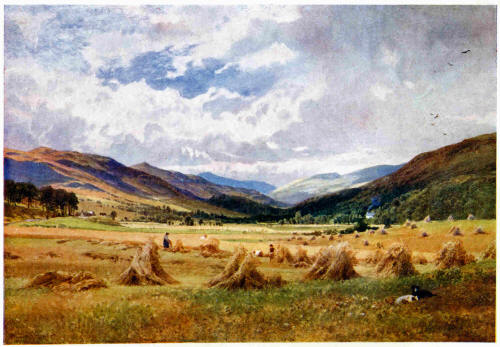
Looking up Glen Lochay near Killin, Perthshire
has not always answered to that of others which stick
to quiet ways and moderate charges.
The Crieff Hydropathic has all along taken a stand
among the latter class, has even had a name for special austerity, due
perhaps to the fact that it is frequented by Presbyterian ministers, as
one at Harrogate is by Roman Catholic priests. But the Scottish clergy,
however formidable in the pulpit, are by no means reluctant to unbend out
of it, within the limits of becoming mirth, as we should know from Dean
Ramsay; and I don't think I ever made one of such a jovial and friendly
congregation as was gathered in this house in the days when not only
strong drink but cards and dancing were under an interdict. One scandal
shocked the proprieties of the place. The doctor, its guiding genius and
strict censor, had gone to be married. The cat being thus engaged, the
mice took advantage of the occasion. Returning unexpectedly from his
honeymoon, our moral and medical director found the kids of his abandoned
flock capering in the drawing-room. I shall never forget the face with
which he stood at the doorway like the statue in Don Juan, then turned
away speechless from sorrow or from anger. His helpless indignation
reminded me of a carter, noted for bad language, on whom certain graceless
loons are said to have played a trick by stealthily letting down the tilt
of his cart as it tugged up a load of sand; then they took a short cut to
the hill top and disposed themselves for listening to his remarks at a
safe distance; but all he could gasp out on discovering his loss, was, "Rin
awa' hame, laddies: I'm no equal to the occasion!" Perhaps that new
character as a bridegroom softened the doctor's severe rule. It is said
that even Crieff has to some extent conformed to the world, yet I doubt if
its frequenters have a happier time of it than in those Saturnian days.
One meets queer characters at such a place, "gorgons
and hydros and chimaeras dire," as a humorist of the neighbourhood
used to call them. A few real invalids and some imaginary ones crop up
among the crowd of ruddy and buxom pleasure-seekers. There was one
gentleman, I remember, who gorged himself at every meal and spent most of
the day in snoring about the public rooms; but at idle intervals
buttonholed all and sundry to expatiate on his woeful lot of having lost
both sleep and appetite. A rarer hydropathic case, and a purple patch on
the general tone of honest bourgeoisie, was a still young ne'er-do-weel
bearing more than one of Scotland's honoured names, who had been in, and
out of, two crack regiments, had run through two fortunes, so he boasted,
and looked on himself as heir to two or three more. Crippled by a drunken
fall, his friends kept him practically imprisoned in this uncongenial
retreat. His sole luxury was a daily carriage airing; and he liked to
drive round the grounds of a certain castle near Crieff, within which the
owner, his uncle, would not let him set foot. It was painful to hear him
talk of what he would do when he came in for the property. He died before
the uncle and the other kinsfolk from whom he had hoped to inherit, a
victim of that plague through which this country has hardly a house where
there is not one dead, soul or body.
One of the great attractions of Crieff is its being
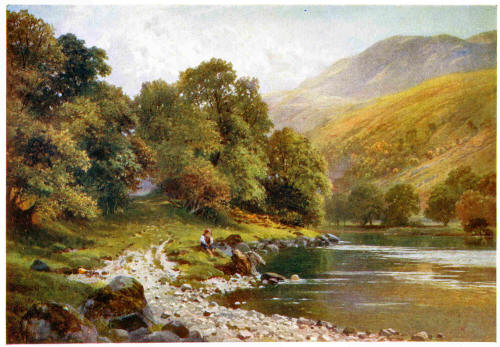
Beneath the Slopes of Ben Ledi, near Callander, Perthshire
environed by noble and famous mansions, some of their
parks thrown liberally open to visitors. Close at hand on the Lowland side
is Drummond Castle with its grand woods and gardens, seat of the old
family of Perth, that has had strange vicissitudes: its representative now
unites several titles in that of the Lincolnshire Earl of Ancaster, while
the direct line of the Perth Earls was ruined by its Jacobite loyalty. On
the hills behind are the grounds of Ochtertyre, which inspired Burns's
muse; and the often-visited Falls of Turret are, among several cascades,
within a short walk. Behind the Knock lie Ferntower, once home of Sir
David Baird, and Monzie Castle, which strangers must remember to pronounce
with its z silent. Southrons will have some difficulty also in
getting their tongues round the name of Cultoquhey, famed by the Laird of
Cultoquhey's prayer: "From the greed of the Campbells, from the pride of
the Grahams, from the ire of the Drummonds, and the wind of the Murrays,
Good Lord deliver us!" This laird's name was Maxtone, which hints at his
having emigrated from the Borders among such uncongenial neighbours; but
in the whirligig of time his descendant has taken on "the pride of the
Grahams," being now Maxtone-Graham, with Murrays and Drummonds still
around him. The old laird's familiarity with the Litany may be explained
by the fact of Muthill, a village near at hand, having kept for itself an
Episcopal chapel through all adversities, as well as a parish church with
rare relics of Catholic antiquity. The church and castle of Innerpeffray
are other points or interest in a neighbourhood whose old families seem to
have held their own against English and American invasion, but the Grahams
themselves, Highland clan as they pass for and duly equipped with a
tartan, seem to have come from the south, where Scott puts Roland Graeme's
kin in the Border "Debateable Land."
Of all the lairdly homes about Crieff, the best known
in the world should be Gask, through the several authors whom the Oliphant
family has produced. One daughter of this house was Lady Nairne,
christened Carolina after the unfortunate prince for whom it had suffered
poverty and exile. There was a Charles also, and George III. is said to
have been tickled to hear how, every day after dinner, the old laird would
turn to his son with "Charles, the king's health!" More than any
other writer, by her Jacobite ballads and her remaniements of
popular songs, "the White Rose of Gask" has inspired a tender sentiment of
the lost cause to thrill so many hearts and piano strings, long after
Scottish royalists had transferred their worship to such clay idols as
George IV. In my youth, indeed, there were still Perthshire men who spoke
more or less heartily of the Hanoverian "usurpers." I myself was brought
up in a touch of the same sentiment, though that my father's Jacobitism
went not very deep appeared from the gusto with which he used to tell the
tale of his translating to a lady the inscription on the monument at St.
Peter's dedicated by King George to the "last of the Stuarts," whereupon a
Yankee standing by put in the remark, "I guess George was right smart to
say it was the last of them!" Lady Nairne's hereditary feeling for
the Stuarts might not perhaps have endured the test of experience; she was
a devout Protestant, and in her old age showed sympathy with the Free
Church movement, which is the antipodes of Jacobitism. So modest was she,
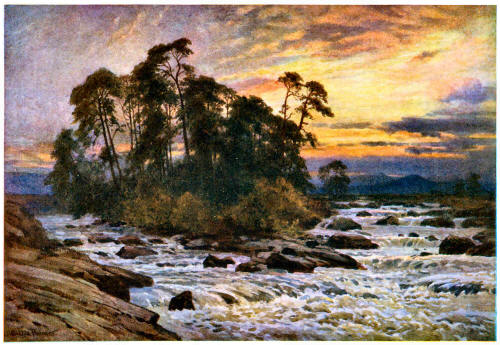
A Wild Spot, Killin, Perthshire
that for the greater part of her life, her neighbours,
and her own husband, were not aware of her hand in the songs which had
crept into wide popularity. It was taken for granted that Burns must be
the author of her noblest strain, the "Land o' the Leal," better known
than understood, as we remember from Mr. Gladstone's blunder in confusing
heaven and Scotland. "The Laird of Cockpen," "Caller Haddie," "Duncan Gray
cam' here to woo," are other favourites among her songs, grave and gay;
but her most recurrent theme was that glorified memory that, like Queen
Mary's, can wing a sentiment to pierce the joints of Scotland's logical
armour,—
Charlie is my darling,
The young Chevalier!
Most charming are the walks by the Highland streams
that at Crieff fall into the Earn; and tempting the longer excursions on
which brakes carry off sociable parties from the Hydropathic. The railway
takes us on up Strathearn to Comrie, a still more beautiful resort lying
on a rich plain between the wooded heights of Glen Lednock and "lone
Glenartney's hazel shade," by which one might tramp across to Callander,
from the basin of the Tay into that of the Forth. A prosaic critic
observes that there is no hazel shade in this glen; but the poet always
declined to "swear to the truth of a song." There is no spot in Scotland
that so well unites lush Lowland charms with rugged features as Comrie;
and it prides itself on being the only spot in Britain troubled by
earthquakes, several slight shocks sometimes being felt in a year, which
may bring a stone wall tumbling down, while scaring wild fowl, making the
trout leap in the burns, fluttering the poultry yard and rattling the
plates in the goodwife's kitchen.
A few miles higher up, the Earn debouches from its Loch
at St. Fillans, near which "the stag at eve had drunk his fill" before
being roused by Fitz-James's hounds. I once made his day's course mainly
on foot, but by a more arduous line over the top of Ben Voirlich, and
moreover without any breakfast till I came upon a shepherd's shanty in the
afternoon; then instead of being welcomed at eve by any Lady of the Lake,
I found every bed full at the Trossachs Hotel, as may often be the lot of
weary wight in this much-toured district. Loch Earn, hitherto a quiet
backwater in the stream of travel, has lately been thrown open by a
railway, at its head bringing one to the Oban line from Callander, whose
lights are now the fiery cross that "glance like lightning up Strath-Ire."
In the other direction, a road from Crieff goes by the
Sma' Glen to Dunkeld, the gate of the mountains for the Highland Railway.
This resort, as tourists know, is a kind of Perthshire Buda-Pesth, the old
town of Dunkeld being on the left bank of the Tay, while the station is at
Birnam on the other side. Village seems a fitter title for Dunkeld than
town, yet it might claim to be a city in right of its Cathedral, whose
choir is still the parish church. This is an ancient sanctuary to which in
part was transplanted the influence of ruined Iona. Gavin Douglas, the
translator of Virgil, was bishop here, but came to die of the plague in
London. With Dunkeld also is connected the memory of Neil Gow, first of
three generations of fiddlers who for Scotland's artless tunes did what
Burns, Lady Nairne, and other writers did for its songs.
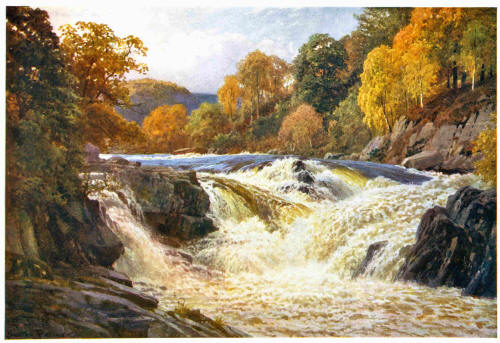
The Falls of Tummel, Perthshire
The Cathedral, as well as the Falls of Braan, the
Rumbling Bridge and other lions are in the grounds of the Duke of Atholl,
the Duke of this part of the world. The Duke of fifty years ago was
a "character" who might be styled the last of the great Highland chiefs.
This generation may have forgotten the sensation caused by his trying to
shut the way through Glen Tilt, and his personal encounter with two
Cambridge undergraduates, who got the best of the scrimmage. Among Leech's
most effective sketches in Punch were that "Ducal Dog in the
Manger" and the cartoon in which His Grace appeared playing the part of
Roderick Dhu to the young Sassenachs. It was said that the Duke took his
revenge on the artist by inviting him to shoot, the highest honour that
can be hoped for in that part of the world; and in the end the pass was
opened by a chieftain "so late dishonoured and defied."
Since his day the champion obstructionist of this
district was the veteran Sir Robert Menzies, who lately died much
respected in the Rannoch country, in spite of an extraordinary itch for
litigation, with his own family as well as with strangers. His most famous
"ganging law plea" perhaps was with a railway company that, by the hands
of half-a-dozen porters, had dragged the chieftain out of a carriage in
which his ticket did not entitle him to ride. The fate of a reverend
English tourist who landed from Loch Rannoch on his grounds was told with
a shudder; and I must be thankful for my own escape when caught in the act
of more than barefaced trespass in bounds where stranger was not always "a
holy name." With a friend of mine, in our hot youth, I had gone in to
swim, when on the lake bank we heard a stern voice and looked back to see
Sir Robert's tartans waving over our clothes. Thus "at advantage ta'en,"
I dare not say that now our blood,
Kept on its wont and tempered flood.
But the "dangerous chief," seeing nothing in our
Arcadian innocence to chafe his mood or cloud his brow, turned off with a
courteous salutation—"Doubt not aught from mine array!"—and the sun's next
glance shone "on bracken green and cold grey stone."
Across the Tay from Dunkeld, in the old duke's time,
reigned an eccentric laird, to whose taste for building are due the
baronial Birnam Hotel and other costly structures in the neighbourhood.
Mrs. Oliphant hangs the scenes of a novel about his own empty and
unfinished mansion; and the chief building among the woods of Murthly is
now an Asylum. As for Birnam Wood, that has long marched off the face of
the earth, to bear out the truth of Shakespeare's legend; but one or two
ancient trees are pointed out as stragglers. Birnam was a favourite haunt
of Millais, a keen sportsman as well as lover of the scenery which forms
oases in the later stage of his art, when he seemed too much concerned to
boil that large pot in Palace Gate.
From Dunkeld it is easy to reach the heart of the
Highlands. A dozen miles of the high road takes us up to hill-girdled
Pitlochrie, and through that pass where Dundee was shot, as pious souls
whispered, with a silver bullet, while his claymores sheared down the
Lowland soldiers, whose prudent leader, himself from the farthest north,
gained in defeat the lesson to invent a more adaptable
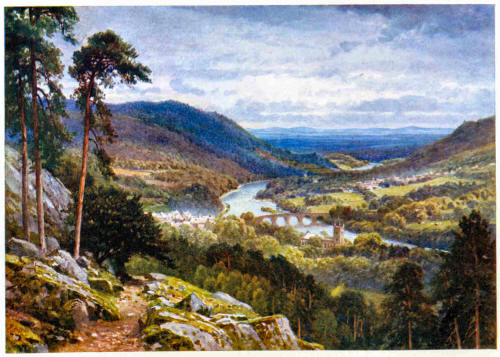
Dunkeld and Birnam from Craigiebarns, Perthshire
bayonet. So terrifying seemed long this Pass of
Killiecrankie that a body of Hessian soldiers, brought over in the '45,
are said to have flatly refused to march through it. But as usual, the
victorious onrush at Killiecrankie did not carry the tartans far. They
were checked at Dunkeld, dourly defended against them by troops of
sternest temper, that Cameronian regiment raised among the most stubborn
Whigs, who here had their baptism of fire and their chance of wreaking
vengeance for bitter memories of Claverhouse. Their colonel, Cleland, fell
in this fight with the barelegged foes he had satirised in verse bristling
with scornful hatred of the "Highland host" brought down as a scourge for
the west-country Covenanters. "They need not strip them when they whip
them!" the Presbyterian poet exclaims like any ribald Cockney, and goes on
to hint how the upper garments of such gallows-birds would not be worth
the hangman's fees. So little love was lost between kindly Scots of those
days, on opposite sides of the Highland line !
Cleland is buried in Dunkeld Cathedral, where Sir John
Steell's modern monument to officers of the 42nd reminds us how this
Perthshire regiment was first embodied in the Dunkeld district about half
a century after the Revolution, having its origin as the Black Watch, so
called from their dark tartans as distinguished from the sidier roy,
red soldier. They were originally raised to keep the peace on the
Highland line, much as Parfidio Diaz has in our day put down the brigands
of Mexico by enlisting the survivors as Rural Guards; but it would be too
much to say that such a loyal and brave corps was made out of the leavings
of that kind gallows of Crieff. Some of the private soldiers held
themselves so proudly, that when a party was brought to show their
exercise before George II. and the king ordered them to be tipped with a
guinea apiece, each man, it is told, re-bestowed this donation upon the
palace porter. Their tartan is a neutral one, forming the groundwork of
several others, for time was when no Macpherson would don the hated
trappings of the MacTavish. War Office arrangements have played havoc with
this sentiment by sometimes redistributing the territorial corps in
red-tape bundles; some years ago a Ross-shire militia battalion tacked on
to the Cameron Highlanders—not to be confused with the west-country
Cameronian regiment—was said not to have a single Cameron in the ranks, a
change from days when Sandy MacDonalds or John Campbells had to be
numbered in the kindred ranks like a long line of kings. The good
discipline as well as the prowess of Highland soldiers was remarkable in
early days, men of the same name and birthplace keeping up each other's
esprit de corps, and no praise or punishment being more effectual than
the thought of what might be posted as to a man's conduct on the door of
his parish church.
The raising of Highland regiments, indeed, was
sometimes carried on after the methods of the press-gang, or by landlords
putting pressure on tenants who might be fathers of stout sons. There is a
story of half-a-dozen brawny Celts tied neck and heels in a cart as
recruits for the Laird of Macnab's "Volunteers"; and clansmen have been
hunted down in the mountains when they refused to follow the modern fiery
cross. There
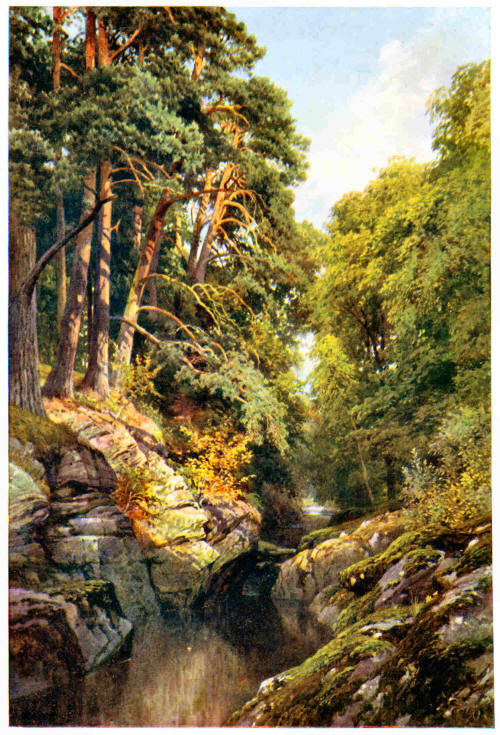
A Wooded Gorge, Killin, Perthshire
would be many a tragic tale of desertion like that of
the "Highland Widow," especially when English martinets added pipe-clay to
Highland accoutrements. But active lads were seldom backward to follow
chief or laird leading them to war; then
Bring a Scotsman frae his hill,
Clap in his cheek a Highland gill,
Say, "Such is royal George's will,
And there's the foe!"
He has nae thought but how to kill
Twa at a blow.
As in the instance of the Cameronians, all Scottish
regiments do not wear the kilt; and of those who do, but few men are to
this manner born in our generation. Alphonse Daudet puts his little hero
"Jack" into a kilt under the title of costume anglaise, which is no
more absurd than the way in which English writers speak of this as the
"Scottish dress." There are even Highland Celts whose ancestors never wore
it; and in its palmy days the kilt was the "servile dress" of clansmen,
whose chiefs as a rule went in trews. Now it is affected rather by the
upper class; and the soldiers who swagger so jauntily in tartans are more
like to have grown up in corduroy breeks. But for this fact, I should have
laid down, as warning to strangers, that the "garb of Old Gaul" cannot be
donned to advantage without youthful familiarity. The wearing of such a
costume, indeed, needs some practice. A Highland battalion of trews
stationed at Southsea became adopted into a kilted regiment some twenty
years ago, when a corporal and file of men were detached from the latter
as instructors for the neophytes
how to carry their new honours unblushingly, so as
forthwith to be christened the "South Sea Islanders" by an h-less
populace. The London Scottish Volunteers should wear the kilt by right of
having Highland blood or Highland property; and it is enviously whispered
that their qualification in most cases may be the possession of a tartan
paper-knife.
It is, of course, the prowess of our Highland regiments
that has made their dress as dear in Scotland as once over half of it this
was hated and despised. The tartans are dyed by the blood of a hundred
battlefields, as by memories of green braes and purple moors. Crude and
criant may be some of their colourings, but not more so than is the
tricolour or the Union Jack. Even if the kilt in its present form were
more or less a modern invention, it is at least older than the Stars and
Stripes, and we know what passionate loyalty that gaudy pattern can call
forth. The other day, I forgathered with a Lowland Seaforth Highlander,
fresh from South Africa, to whom I communicated a report that the War
Office thought of putting him into trousers. "They daren't!" he cried, his
eye ablaze with all the fire of Killiecrankie, where his progenitor might
have chosen for the nonce to be equipped in the lightest running costume.
Strange how the Celtic leaven rises in the stodgy
composition of British nature ! What is this infectious quality it has? We
are Saxons in business, and well for us it is so; but in hours of ease and
sentiment we hark back to the race older on our mother earth. English
settlers in Ireland notoriously become Hibernis Hiberniores ipsis.
English workmen in Welsh quarries, it is said,
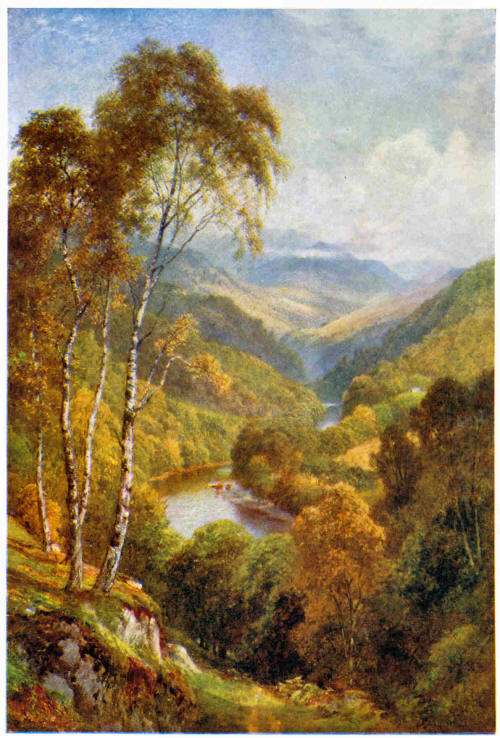
Looking up The Pass of Killiecrankie, Perthshire
learn to speak Welsh rather than their comrades
English. In the long run the stolid Teuton grows to be proud of his
lighter strain. I who write can trace my descent with unusual clearness
back to a Norman adventurer whose progeny appears to have settled for a
time in the Breadalbane Highlands, but long ago came down to opener
straths—
The mountain sheep were sweeter,
But the valley sheep were fatter.
The alliances of my kin were for generations with the
English-speaking Lowlands, where their neighbours had cause to look on the
wild Highlandmen as an American backwoodsman looked on Mohawk or Shawnee
warrior. My forebears "had no use for" kilts, if some perhaps for dirks
and claymores. I know of only one recent strain of Highland blood, and
that at second hand through England, to make me a Celtic quadroon, so to
speak. Yet there is many a Scot, with no more claim to Highland lineage
than mine, who cannot see the tartan even in a Princes Street shop-window,
or hear the pibroch wailing over forgotten graves of his father's foes,
without a certain stir of spirit which a biological philosopher might
explain as waves of molecular disturbance propagated through the nerve
centres by vague emotional combinations organised in the earlier
experiences of the race. Boswell confessed to the same weakness, and what
had he to do with the Highlands?
Where were we before launching forth into such a
chequered digression on the "lad wi' the philabeg"? In the Atholl country,
by Loch "Tummel and banks of the Garry." Above the Pass of Killiecrankie,
the pedestrian who does not shun a thirty-miles walk to Braemar may turn
off through Glen Tilt, with its gloomy gorges and snowy falls. But the
coach-road to the Cairngorm Highlands goes from Dunkeld to Blairgowrie,
then northward by the Spittal of Glenshee, the highest highway in Britain,
at one point over 2000 feet, whose "Spittal" was a Hospital or Hospice
that made a Highland St. Bernard's. I once sought to hire a horse at an
inn on this road, but the landlord explained how it had gone off with "a
man called Morell Mackenzie, who seemed in an awfu' hurry." That locally
unknown celebrity was in haste to an illustrious patient on Deeside, an
errand that would breed much bad blood in another country.
The first stage of the journey is lowland rather than
highland, its chief feature being a chain of small lochs, stocked with
perch, on one of which stands Cluny Castle, cradle of the "Admirable
Crichton." Blairgowrie, with Rattray for its tiny Westminster, rivals
Crieff as the second town in Perthshire, but is not so much a place of
resort, laying itself out rather as an understudy of Dundee by its
flax-spinning mills on the Ericht; and it seems a miniature of that
longest and busiest of towns, the German Elberfeld strung out along the
Wupper valley. Wildly romantic still is the walk up the Ericht, whose
shaded pools and rapids, above the town, come down through a grand gorge
overlooked by Craighall, one of several candidates for the honour of
having sat to Scott as "Tullyveolan." From this gap in the Highland line a
short branch puts us on the main line of the Caledonian Railway, which
competes with the North British as route to Aberdeen.
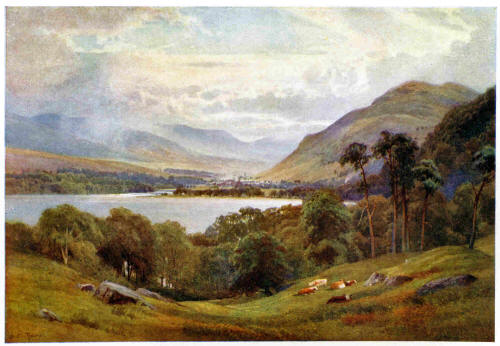
Killin, Head of Loch Tay, Perthshire
Other Caledonian branches lead off to charming glens on
the old Highland line, now facing east towards the lowlands of Forfar and
Kincardine. But of Alyth, Edzell, Lochee, one need only say that they lie
among sweet and noble scenes as well worth visiting as others better known
to tourist fame, and that even prosaic Kirriemuir, Mr. Barrie's "Thrums,"
is a base for long moorland tramps into Deeside, over a part of the
Highlands as yet innocent of railways.

